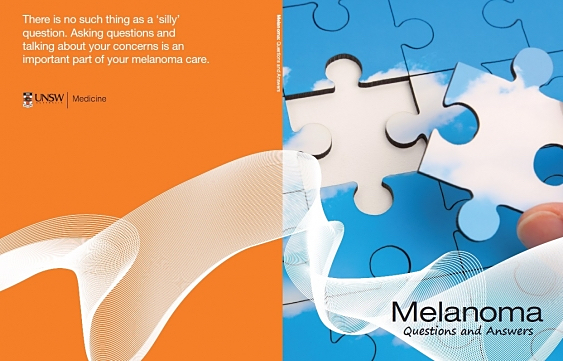 A new psychological intervention developed by a team of researchers based at Australia’s University of New South Wales, The University of
A new psychological intervention developed by a team of researchers based at Australia’s University of New South Wales, The University of  Sydney, and the Melanoma Institute Australia, in partnership with three high-risk melanoma research clinics in New South Wales, has proved effective in significantly reducing melanoma survivors’ fear of the cancer recurring.
Sydney, and the Melanoma Institute Australia, in partnership with three high-risk melanoma research clinics in New South Wales, has proved effective in significantly reducing melanoma survivors’ fear of the cancer recurring.
Results of a new clinical trial were published in the Journal of Clinical Oncology in the study “Psychoeducational Intervention to Reduce Fear of Cancer Recurrence in People at High Risk of Developing Another Primary Melanoma: Results of a Randomized Controlled Trial.”
The researchers note that while 70 percent of people who have had melanoma report high levels of fear of cancer recurrence (FCR), psychological support is not routinely offered as part of their melanoma care.
The randomized controlled trial (ACTRN12613000304730) examined the effectiveness of psycho-educational intervention aimed at reducing fears of cancer recurrence and improving psychological adjustment in a patient group of 164 participants with FCR compared to a control group of melanoma survivors who received usual care.
Differences between treatment and control groups for patient-reported outcomes were examined, including FCR, stress, anxiety, depression, melanoma-related knowledge, satisfaction with melanoma care, health behaviors, unmet needs, and health-related quality of life.
At six months, the intervention group reported lower FCR severity, trigger, and distress scores than the control group in the baseline-adjusted models. The decrease in FCR severity (but not triggers or distress) remained statistically significant after adjustment for other covariates. The intervention group also reported lower stress and improved melanoma-related knowledge compared to the control group, but no differences were found between groups for other secondary outcomes.
The researchers conclude that this newly developed evidence-based psychoeducational intervention technique is effective in reducing FCR and stress and for increasing melanoma-related knowledge in people at high risk for another melanoma, halving the proportion of patients who had a fear of cancer recurrence that would require treatment.
Associate Prof. Nadine Kasparian, one of UNSWs 20 Rising Stars, notes that fear of cancer recurrence is associated with poorer quality of life and lower satisfaction with melanoma treatment, and can also influence behaviors important in melanoma care, such as skin self-examination and sun protection.

“[FCR] can also result in the overuse of health services and increased costs to the healthcare system,” Kasperian said in a press release. “Despite this, we still see big gaps in access to mental healthcare for people with melanoma. We see this program as a way of really addressing this issue.”

“This intervention halved the number of patients who had a fear of cancer recurrence that would require treatment. That’s quite an extraordinary result,” said University of Sydney Prof. Scott Menzies, deputy director of the Sydney Melanoma Diagnostic Centre and a chief investigator on the study. “As doctors, we often don’t respond to the psychological needs of patients as well as we should, and that’s an unfortunate reality. This type of work will hopefully change the way clinicians holistically look at their patients.”
Jay Allen, a melanoma survivor and a community coordinator with Melanoma Institute Australia, believes psychological interventions like this are crucial to supporting people through their experience of melanoma.
“It means the world, because you know that there’s support there. The fear, it never leaves you. You’re certainly never the same person you were before you were diagnosed,” he said.
Preparations for a rollout of the intervention program are underway at melanoma centers throughout Australia, and a new resource, “Melanoma: Questions and Answers,” will also soon be publicly available.

While the intervention was developed for people with early stage melanoma, the research team hopes to adapt variants tailored to helping people with later stage melanoma or other forms of cancer.


